Picking Fruit
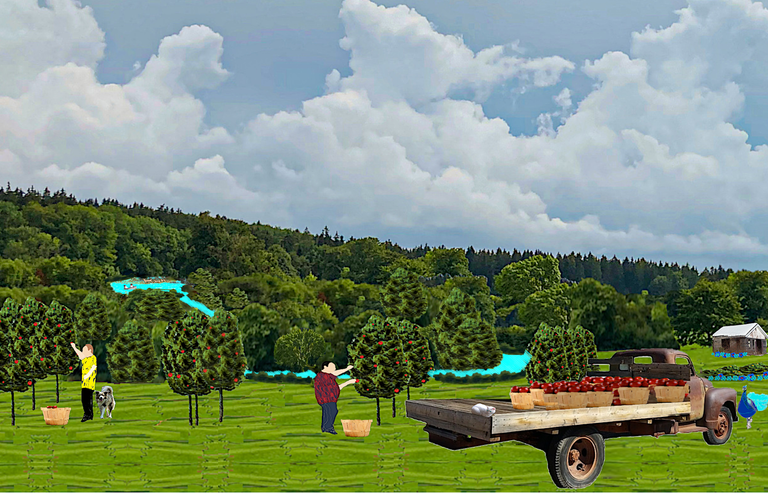
This week's template photo (LMAC collage contest #170) almost offered a blank slate. We had a wide field and distant horizon to work with. Sometimes, freedom is not a gift, but this week I enjoyed it. I went back to my youth and country scenes I remember vividly. It was fun to bec absorbed in that environment.
The Template Photo by @shaka
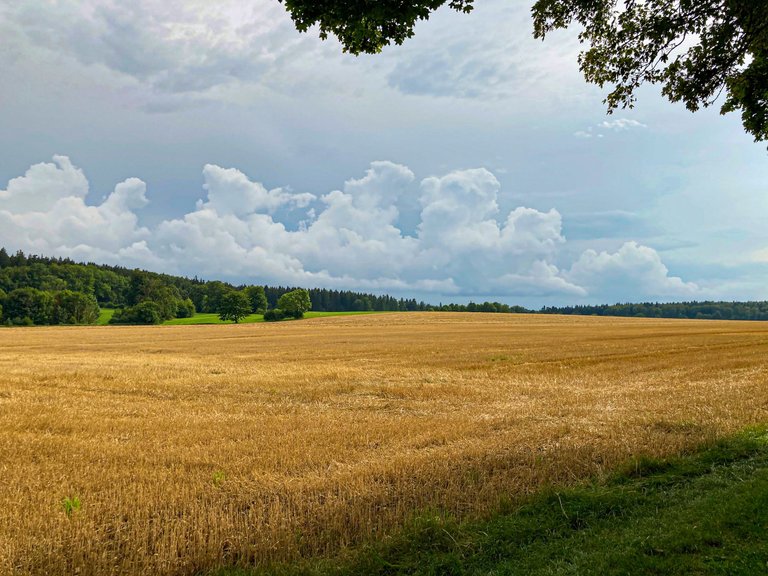
The bucolic scene in my collage is rather deceptive. Behind the scenes, danger lurks. A report from the National Farm Workers Ministry in Canada describes some of the perils inherent in farm work.
- Injury:
There is risk from injury by farm machinery. Physically repetitive activity wears on joints and muscles. The U.S. occupational safety agency, NIOSH, reports that farm work is one of the most hazardous professions. Not only is the worker exposed to danger, but family members share that exposure.
- Heat Stress:
The Ministry reports that workers face not only dehydration and heat exhaustion, but also heat stroke and even death. The USCDC calculates that farm workers suffer heat related death at a rate 20 times higher than the rest of the civilian population.
Farm Workers, Lobeco, South Carolina, USA (1962)
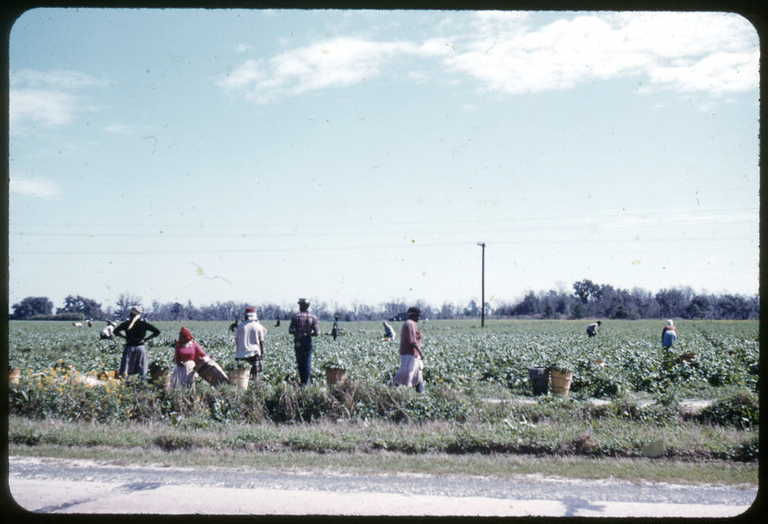
Archives Branch, USMC History Division. Used under CC 2.0 license.
California is the only state in the U.S. that requires minimum access to water and shade during the day for farm workers.
Exposure to Pesticides for farm workers is direct and indirect. As they work in the fields, the workers actually my be sprayed as the pesticide is applied to produce. Also, as the workers collect the produce, they are exposed to the residue of insecticide on the fruits and vegetables.
In 2020 the U. S. NIH published the results of a review that looked at studies of farm worker pesticide exposure. 35 studies from around the world were analyzed. The conclusion of this analysis was that pesticide exposure is not only common among these workers but that it exacts a serious health cost in the population. Poor (or no) protective gear, misuse of protective gear, and lack of education about the dangers of exposure are partly blamed for the high risk.
Tobacco Harvesting in a Stream Bed, Dry Season, Mali, 1980
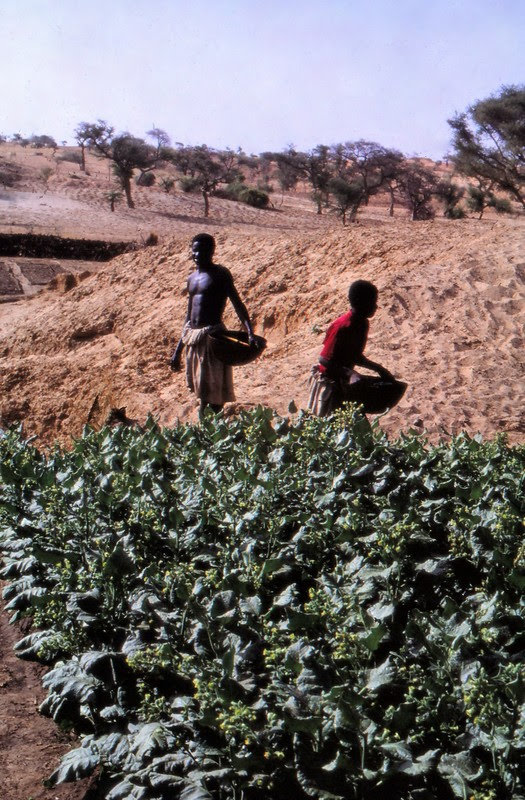
Attribution: W.E.A. van Beek. Used under CC Attribution-Share Alike 4.0 International license
Farm workers who pick tobacco may suffer nicotine poisoning. The poisoning is more likely to occur in circumstances of extreme heat because sweat facilitates absorption of nicotine into the blood stream. Not only that, the poisoning intensifies the effects of heat stress, so that workers in tobacco fields are more likely to become ill from heat stress.
Children and adolescents (yes, children!!) are more susceptible to nicotine poisoning than are adults.
- Child Labor
According to Human Rights Watch it is legal in the United States, "for children at age 12 to be hired to work unlimited hours outside of school on a tobacco farm of any size with parental permission, and there is no minimum age for children to work on small tobacco farms or tobacco farms owned and operated by family members."
The Association of Farm Worker Opportunity estimates that there are between 400,000 and 500,000 child farmer laborers in the U. S. The (rather long) C-Span video linked here records a hearing conducted on the gaps in U. S. labor laws that leave children working in agriculture unprotected.
https://www.c-span.org/video/?522656-1/hearing-child-farm-worker-protections
I borrowed richly from LIL, the LMAC Image Gallery. Thank you to each of the LIL contributors who helped to make my collage possible.
@redheadpei
dog
farm shed
canoe
@adncabrera
little girls (in the canoe)
@Muelli
tree (served as basis for apple trees)
@agmoore
pond
deer
Peacock-private photo
I also am grateful to contributors on public domain sites listed below
Basket
diapicard on Pixabay
truck
brianoney on Pixabay
farmer
lpuo on purepng
The process was not linear. I hopped around quite a bit. Early on I decided to focus on the trees and green pasture in the background. I'll show a few of the numerous steps I took in completing this collage.
I expanded the green area so I could build on a scene there:
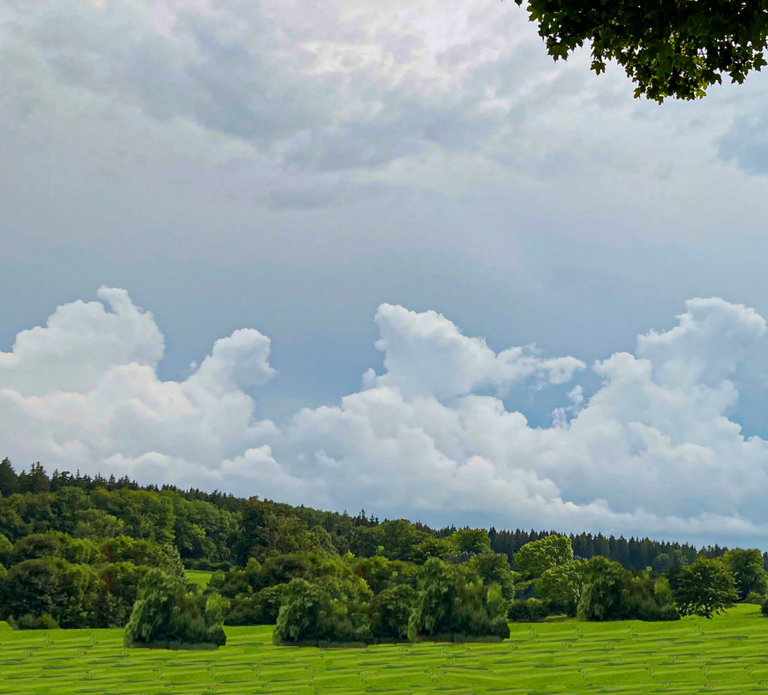
I took @muelli's tree, filled it out, place fruit from @yaziris on it and placed the tree (multiplied) in the green space:
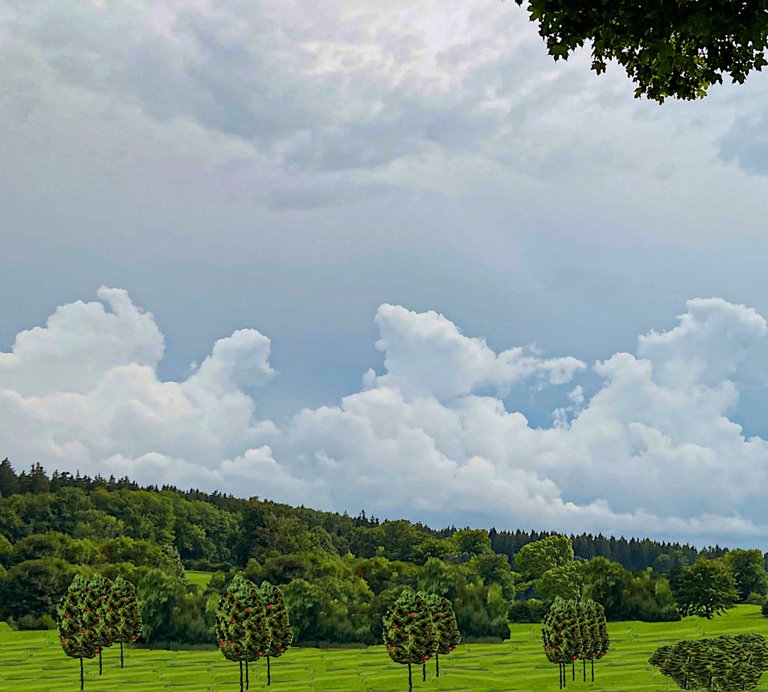
Both fruit pickers came from the same image on purepng.
I had to move the figure's legs and arms around, change the flesh and hair tone, (I didn't want my picker to be a cliche) and change the pickers' outfits so they would look like two different men. I added the flatbed truck, apples, baskets, dog, and shed/house.
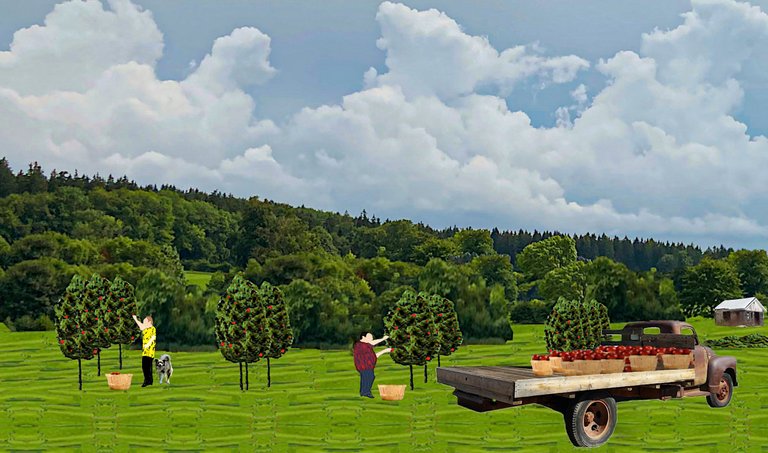
I added a pond and put deer near it. Also, two girls in a canoe.
I put a lot of time into placing the girls in the canoe, but you can hardly see them in the collage. I touched up the boat and heightened the color on the dresses. Still, you can't see these elements unless you look very closely:

Flowers, peacock, stream and cat came last. Plus, I tried to sharpen the trees a bit, and I trimmed the width of the picture. My result is not exactly what I was going for, but it's close:

Making collages is a creative exercise and a learning experience. This week I learned a little more about farm workers. Please check out our winners from last week's contest, just published today. Tomorrow a new template will be published. Make a collage and join in the fun.
You can see that LIL, the LMAC Image Library, was an essential part of my collage creating process this week. Everyone on Hive can contribute to the library and everyone can borrow from the library. Learn about the procedure here.
I wish all my readers peace and health.
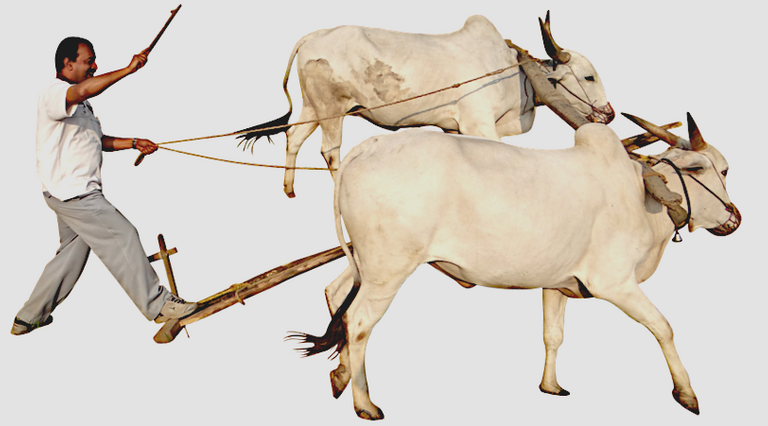
Excellent, creative and very well presented this publication @agmoore, also accompanied by information of great interest as it is agriculture and the promoters of this important practice such as producers or farmers. Since you mentioned some of the negative things that these farm workers live, I take the opportunity to tell an anecdote from my family. My father for more than 40 years was dedicated to agriculture, even had several hectares of land that was dedicated to planting sugar cane and other crops, when he received the professional inspection of engineers in order to improve the quality of their crops sold them a lot of chemicals, my father applied them and so far so good. However, at one point my mother became pregnant and the baby was not fully formed, specifically its head, for this reason it was stillborn and after many studies it was determined that the cause was due to pesticide residues, in short my father already had traces of these products in his body and this affected the baby's development.
This was one of the reasons why I studied Agronomy, the purpose was to know everything that surrounds this world and seek methods that are friendlier to the environment and those who are exposed to modern agricultural practices, I learned a lot from my father and the university made me strengthen this knowledge. Agroecology seeks to implement changes in this system, but it is difficult to fight against industries and change people's mentality, sometimes it is not healthy to eat vegetable products, especially if you do not know how they are produced.
A big greeting and good health @agmoore, a pleasure to read you.
That is a heart-wrenching story, @abneagro. Without farmers, most of us would not eat. They are the silent heroes, unsung in society. Farming is hard, so I understand why people look for shortcuts, but nature doesn't understand.
When I was a child I remember on my grandfather's farm trucks used to go down the rows of fruit and spray them. It was routine. Today his granddaughter runs an organic farm. No chemicals of any kind. I hope that is the wave of the future, but it seems not to be the case.
Thank you for your comment and for sharing the story about your family. From a terrible event great good has come, because you educate all of us.
A big hug to you, my friend, @abneagro. Good health to you and your family.
@abneagro, @agmoore, you are absolutely right that it is unlikely that the farming of the future will be organic because there doesn't seem to be a simple solution. I have read that pesticides are used because many of the crops we grow today, especially grains, are too weak to be able to survive in the wild. Without pesticides, the amount of labor needed to produce enough food from those crops would be extreme. That is actually why we started using pesticides and synthetic fertilizers to begin with. The same is true for many of our livestock. Any pasture raised chickens either have their diet supplemented with grains, which is what most do, or they are forced to kill off all of the local predators.
Organic farming is basically pre-industrial agriculture. One reason I am skeptical that society will or even can switch to organic farming is because all farmers use shortcuts. Farming itself is a shortcut over hunting and gathering, and farming itself has lead to deforestation and pollution long before pesticides were ever invented. I am not against farming and I don't think we should go back to being hunter-gatherers like some cranks think though. I just don't see there being a simple solution like I thought there was growing up.
Your ideas to complete the collage brought a new meaning to the provided template. Very detailed and expressive regarding the farming sector. I found myself constantly connected to it.
It was great going through your post. Thank you for sharing!
Thank you very much, @splash-of-angs63. For me it is a challenge to create a collage because I have no art skills, but that attention to detail is relaxing. I'm pleased you read the post. Farm workers, especially migrant farm workers are almost invisible in our society. They do their work and move on.
Thanks again for your kind comment.
Hi @agmoore 👋
It is a beautiful collage and the scene is so rich in little details. 👍 I love this lake with the playing children in the depth of your scene.
And it also shows how much work harvesting is. One has to pick a lot of fruits to load at least one truck, which is beautifully demonstrated in your collage.
It is truly a shame how much greed shifts suffering to the lowest level of the pyramid. We all need to directly support only our regional farmers. This may be the only way to relieve the pressure exerted by greedy bulk buyers (mega companies).
Where there is no price pressure, there is no production pressure, there is no need to use production-enhancing chemicals, there is no need for slavery.
Farm work is hard anyway. It must be decently rewarded, so that it also has a positive effect on working conditions.
Thank you for raising this important issue! 👍
Have a wonderfull Thursday, @agmoore. :-)
The last thing I read before I went to bed last night was your comment🌼 Thank you. Working on the details is kind of like meditating. The focus and patience is very good for me, I think (or for anyone!).
I remember the farm workers of my youth. They were almost invisible, separate from everyone else. They came and they went with the seasons like shadows. Even their kids in class were almost unnoticed. Good teachers did their jobs and tried, but the kids were almost placeholders, because everyone knew they'd be leaving when harvest was over. Thank you for your interest and compassion.
I appreciate the attention you pay to my simple work. As @shaka has said, everyone is an artist. LMAC offers a lot of benefits to Hive and participants, and this is one of its greatest gifts. It allows people to discover the artist inside.
Have a most wonderful end of week my friend, @quantumg. Special treat for Frieda, our newest star🐕
Farm work is not easy and the workers will not get rich on their wages. Many foreigners come to the Island to work at harvest time and at the fish factories.
Thanks for using my lil image of the abandoned boat. Nice work putting the girls inside it. I was able to see it in the upper water. 😊
I’m looking forward to seeing the hummingbirds return. They should be here any day now. Their feeders are full and waiting for them. They will need refreshments after the long journey from the South.
Hello dear @redheadpei,
My grandfather owned a large farm, and hired a lot of workers. Most were migrants, some were permanent. I remember the concrete brick dormitory the migrant workers lived in. They had nothing, really. Their kids would come to school seasonally and were always at the bottom of the class. Even as a child, I saw the injustice--economic and social.
Your pictures are so expressive. I appreciate that you offer them to us. Our pictures are so much better because of them😇
And they know where to find that refreshment 🐤 You will surely be posting pictures of your return guests.
Have a wonderful week my friend.
For someone’s who is not actively participating in a contest you surely came up with an amazing work, very intricate and beautiful writeup.
I never really thought about all these hazards being available when it comes to farm work, and now I have a whole new perspective to things. It was a great read and another Learning opportunity for me. Thanks
Hello @nattybongo ,
Thank you for visiting my blog.
I do spend a lot of time on my collages and invest some energy in my blogs. The collage for me is like therapy. It is relaxing. It's a way to be creative and to share that with others. Also, I usually write about subjects that interest me, so this is not a chore to research.
Yes, farm work is hard. My grandfather was a farmer. When you are a farmer the whole family works. Everybody pitches in. For migrant workers, there is all the work, but none of the reward my grandfather enjoyed.
I hope you have wonderful Thursday!
Thoughtful piece. AI will replace all farm workers, so their well-being and mistreatment will no longer be an issue. Of course, they'll be out of a job, but they'll find something else I'm sure.
Hello @litguru,
Thank you for reading and commenting. Always interesting.
All those robots in the field? How expensive will that be for the farmer? What kind of overhead will the farmer have? Are you sure an underpaid worker without benefits would not be cheaper? Isn't that the bottom line?
I'm sure I won't be around to see the development, unless it happens really, really fast😄
I'm being provocative with my AI comment, but I think I'm presenting the worst (or best) case scenario in regards to AI's impact on the labour force.
You'll be surprised how fast things can ramp up in the tech sector. To put things in context, in the USA, about 90% of the population was involved in agriculture during the 1850s. Now, it's less than 2%. So, it's not outside the realm of imagination to see AI picking up the remaining 2%.
I looked into my crystal ball, and I predict that farming as we know it will disappear with the advent of intelligent agents. It will remain a hobby, the way fishing, bush-crafting, and camping are today. You will also win the lottery if you buy the numbers inside the fortune cookie. :)
😂